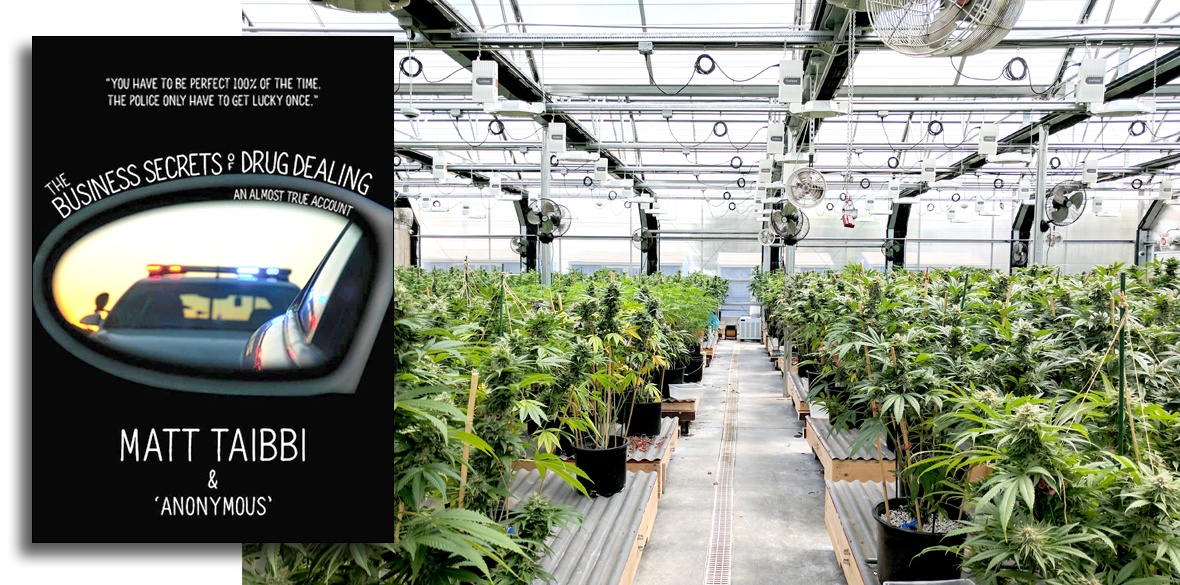This is the last article you can read this month
You can read more article this month
You can read more articles this month
Sorry your limit is up for this month
Reset on:
Please help support the Morning Star by subscribing here
The Business Secrets of Drug Dealing: An Almost True Account
by Matt Taibbi
(OR Books, £17.90)
IN DONALD TRUMP’S capitalist self-help tome The Art of the Deal — a book he of course did not write and which has since been disowned by its ghost writer — he outlines his rules for getting ahead.
They include: “Think big,” “Maximise options,” “Use leverage,” “Fight back” and “Contain costs.” In Trump’s hands, these translate into swamping and blackmailing the competition, smearing them in the press and refusing to pay your employees.
A more honest and human-centred approach to the brutishness of business under contemporary capitalism can be found in journalist Matt Taibbi’s account of the code of ethics and practices of “Anonymous,” an African-American marijuana dealer, in The Business Secrets of Drug Dealing: An Almost True Account.
This well-structured narrative of a dealer who calls himself Huey Carmichael after two black revolutionary icons — Black Panther co-founder Huey Newton and civil rights organiser Stokely Carmichael — recounts how he both builds a thriving business but is also then forced out of it at the moment of drugs legalisation. As is true with every other business, it is taken over by hedge funds.
As in a crime mystery novel, the dealer realises someone in his network is betraying him and he doesn’t discover until the end who it is.
Carmichael has Trump-like rules in his trade as well. These include, “Minimise your risk” and “A loss isn’t a loss, it’s a lesson.”
But he must also adapt his code to life in white America: “In business, racism is your friend if you master the nuances.” Prominent among these is his articulateness, in abundance in the writing of the book, which he uses as camouflage: “If a black man can put a sentence together it throws everybody off. Teachers, cops, business partners, everyone.”
He goes into business with a white “organic” grower — a “lumbersexual” — and has no illusions about his place as a black businessman in the US: “I believe in money. So does America. Beyond that we have no relationship.”
He takes full advantage of the devastated economy after the 2008 mortgage crisis, so bad that “people don’t look at drug dealers with disdain anymore: they just think of [them] as someone who is lucky enough to have a good job.”
His view of the police contradicts that of the resourceful and intuitive investigator of crime novels and series such as CSI. Cops, in his experience, are mostly dumb brutes who can’t or won’t do “real detective work” and their only recourse is to round-up snitches, force them into police vans and intimidate them into turning over, either truthfully or not, their fellows.
That’s why, he says, police only concentrate on street busts and seldom go higher. He notes the angry looks of cops when they talk to lawyers who know the law better than them and he recounts how a police search of his bag with $3,000 in a hidden compartment failed to discover the money.
But by far the most interesting part of the book is its detailing of the moment when Wall Street and corporate agribusiness, sensing legalisation and a profitable enterprise, begin moving into the trade and exerting legal strong-arm tactics, including employing the government Drug Enforcement Agency and informers to remove independent dealers like him.
He names the carcinogenic pesticide polluter Monsanto and the food conglomerates Archer Daniels Midland and Cargil as new players now buying up marijuana growers and getting ready to monopolise the market.
In what Carmichael calls a “cannabis coup” to keep the old dealers away from the “coming pot of gold,” these companies, in league with banks and hedge funds, drove down the price — in some cases from $3,000 a pound to $400 — so that large-scale growing was the only way to profit.
They then set up a licensing system in California, the state where the best pot is grown, to keep anyone with a criminal record out of the business. He calls this “the everyday illegality of capitalism” and notes of this disenfranchising that “racism in America is in money.”
Carmichael exits the business and becomes, of all things, a political worker on the 2016 Hillary Clinton presidential campaign, detailing from the inside its deceptiveness. When asked at a fundraising meeting of growers if the Democrats would support legalisation, the reply came that it supported “further research.”
The growers, mostly African-American and Latinx, left the meeting with a pained expression “as if they were passing kidney stones” and Carmichael concludes that the Clintonites were “much worse than Trump for people of colour.”
After seeing his business taken from him, he concludes that in a “country founded on capitalism” where “black people were the first commodity sold on Wall Street... as soon as black people find a way to build up anything, rich people find a way to take it away.”









